
Covid-19 Response minister Chris Hipkins announced today Cabinet had confirmed the protein-based vaccine would be available to Kiwis aged 18 and over.
Initially, it would only be available as a primary course - dose 1 and 2. It was not currently approved for use as a booster dose.
"Novavax is a protein-based Covid-19 vaccine and while the Pfizer Covid-19 vaccine remains the preferred vaccine of most New Zealanders, for some people, the arrival of Novavax will be the extra incentive required to get vaccinated against Covid-19," he said.
"There's no reason to doubt that with the introduction of Novavax, New Zealand can continue to nudge up our vaccination rates.
"We're already one of the most highly vaccinated countries in the world – at 95 percent of people aged 12 and over – and we can go higher still, which will make us all safer."
Director-general of health Dr Ashley Bloomfield said deliveries of Novavax were expected in the coming weeks and could be administered to the public by mid-March.
While mRNA vaccines such as Pfizer's come with instructions for cells on how to make the Covid-19 spike protein, it comes ready-made in Novavax.
"[Novavax] has a bit of the germ, if you like, and that differs from the mRNA which carries the instructions for the bit of the germ," University of Auckland vaccinologist Helen Petousis-Harris explained.
Some yet to get vaccinated had voiced their intention to wait for Novavax - most notably Thames-Coromandel mayor Sandra Goudie.
Bloomfield today estimated more than 200,000 Kiwis hadn't had any Covid-19 vaccine, but was unsure how many of them would be agreeable to Novavax.

"Let's just see with Novavax whether the many people who said they would have it, do come forward and have it," Bloomfield said.
"I encourage them to do so, it's a good vaccine, it's an effective vaccine, it's a relatively safe vaccine."
Bloomfield confirmed New Zealand's vaccine programme would be "mRNA based", given its widely proven effectiveness against Omicron with a booster dose.
Petousis-Harris remained circumspect as to whether unvaccinated Kiwis who had cited Novavax as their preferred vaccine would keep their word.
"A lot of them said they would but I think we've seen examples of people who have said that and have changed their minds, but I was always a bit sceptical that many would take it up so that remains to be seen."
Nevertheless, Petousis-Harris was pleased with the addition to New Zealand's vaccine portfolio.
She acknowledged it would be a valuable alternative for people who had experienced allergic reactions to the Pfizer vaccine on their first dose and were yet to get their second.
Pfizer's mRNA vaccine still proved very effective. Petousis-Harris cited a British study that indicated a primary course and booster dose of Pfizer saw immunity against serious disease from Omicron reach 90 percent.
Protection against getting symptoms after the three doses was reportedly slightly lower at about 80 percent.
Petousis-Harris said it wasn't yet apparent how well Novavax would protect a person against Covid-19, but early indications were promising.
"Judging by great clinical trial performance, you'd expect it to be protective but where it falls compared to others, we've got to wait a bit longer.
"In the end, the proof is in the pudding but I think it's fair to say it's a nice vaccine and it's good to have it."












